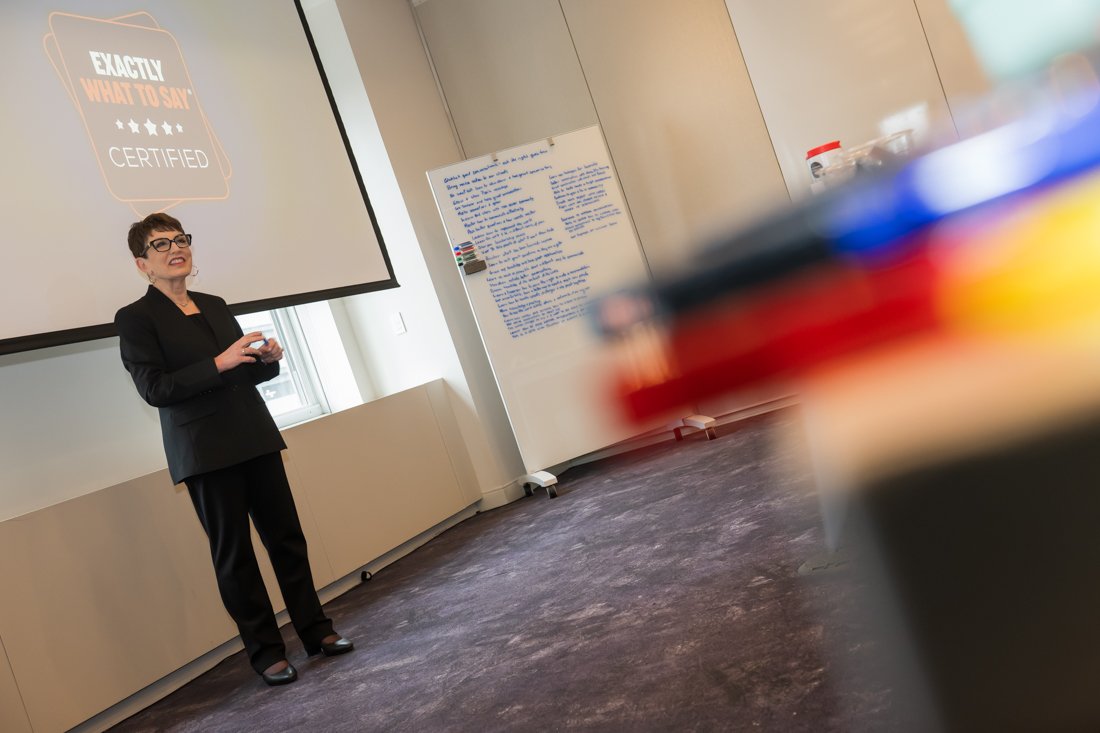EWTS Certified Guide Tricia Brouwers is used to speaking to a room full of strangers. She has worked in the mortgage industry for over 29 years and is a seasoned professional at talking to new people.
Tricia loves nothing more than helping someone achieve the dream of homeownership, but getting it right requires time and effort. She needs to understand absolutely what her team and their clients need, and they in turn, need to trust her to get it right.
The secret for Tricia is strategic communication, which means entering a room full of strangers and earning their trust.
If you need help talking to new people or you want to get some insight from an expert, then this blog will be perfect for you.
Tricia recently hosted one of the EWTS Critical Conversations Webinars called From Moment 1 to Momentum – How To Start A Conversation In A Room Full Of Strangers To Grow Visibility And Start Earning Trust.
Those who attended learned how to make the most of their networking opportunities and get better at starting conversations with strangers.
This blog features some of the highlights.
What Makes A Successful Networker?
Out of curiosity, who do you think is more successful at networking, an extrovert or an introvert?
Could it be possible that an introvert is better because they are more comfortable with silence?
The need to fill space with words can actually decrease conversation and increase uncertainty.
What happens in your mind when someone just talks about themselves during a conversation? For most people, it prevents the discussion from evolving.
The key to successful networking is to remain curious. Your objective should be to discover, and your questions should reflect this.
Momentum can be established from moment 1. It is a series of small successes that lead to a bigger success; you just need to be brave enough to take the first action.
What’s Holding You Back?
One action can create a ripple effect like a pebble in a pond.
But Tricia doesn’t want you to settle for creating a ripple. She wants you to start creating waves.
What holds you back from entering a room full of strangers?
Do you worry about what to say or that you might be awkward and out of place? You might experience social anxiety or be terrified of getting rejected. These are all common worries, and you’re certainly not alone in feeling this way.
The one thing that all of these worries have in common is that they are fear-based, and it’s usually the fear that is holding you back.
Tricia’s son Daron has autism, and fear could have engulfed their lives as a family.
Early on, they were told that Daron might never speak or function typically in this world and he likely wouldn’t be able to live independently.
People told them that so many things would be impossible for him.
But, instead of focusing on what was impossible, they wanted to think about all of the things that were possible.
Your Mind Is A Powerful Thing
Your thoughts can very quickly become your beliefs, and your beliefs have the ability to become your actions.
If you tell yourself that you can’t talk to strangers or that you’re no good at it, then your actions will reflect this.
The good news is that you can control the internal dialogue before engaging in the external conversation.
You can follow a process that could ease your anxieties and become your guide to engaging in future Critical Conversations.
In EWTS, it is referred to as the 5-step dance.
Questions start conversations, and those conversations can lead to relationships.
The relationships you start provide future opportunities, and opportunities can create action.
You should always start a conversation with questions, and this can begin even before you verbalize anything to anyone else. The internal conversations before the external ones is a brilliant first step.
You can use this process on yourself, too, and start asking questions to work on the relationship with yourself.
Questions You Can Ask Yourself:
- What does success look like to you?
- What habit can you create to get closer to your goal?
- Where do you have opportunities that are unrealized? – Most people think if they had more opportunities, they’d get more results. But more isn’t always more.
- Who are looking to serve? When you know who you are trying to serve, you can offer appropriate solutions for their needs.
Is it possible that how you handle external conversations completely depends on how you handle your internal conversations?
This powerful internal dialogue allows you to get into a relationship with your goals, which is when opportunities can start.
If it’s true that you only have one time to make a first impression, then how will you show up?
6 Practical Steps To Start A Conversation
There are 6 simple steps to starting a conversation and building trust. The main goal of these steps is to establish and build trust.
1
Keep It Simple
Did you know the fastest way to break trust is to put yourself before someone else?
But this also means that one surefire way to establish it is to put someone else ahead of your own needs. So keep it simple and remain curious. Don’t put too much pressure on yourself.
Remember, building trust isn’t really about you; it’s about spending time getting to know the person you’re talking to, and that only happens when you really listen.
2
Do Your Recon
The worst time to think about what you’re going to say is in the moment that you are saying it. The more prepared you are, the more confident you’ll be and the better impression you will leave.
Your recon is your pre-brief and should include:
- What questions should you ask?
- Who should you ask?
- What conversations should you be having?
- What relationships do you need to create?
3
Be A Director Of Intrigue
How can you be a director of intrigue?
At a networking event, how often are you explaining what you do or asking what someone else does?
This can feel repetitive, and it doesn’t really teach you much about the inner workings of the person in front of you.
Instead of leading with what you do,what would happen if you focused on why you do it?
Could it be possible that your reasons for being there are more interesting than your professional role?
Just imagine if a Simple Swap like this built more trust with a prospect.
4
Set A Goal
Do you know why you’re walking into that room full of strangers? What is the purpose? What is your end goal?
Without clearly setting your goals, you might go into the room not working instead of engaging in crucial networking.
5
What Happens Next?
Be clear about what happens next and schedule times in the future to continue the conversation. You can try asking questions like ‘When would be a good time to ….?’
A phrase like this allows you to schedule a time in the future to pick up where you left off.
6
The Big FU
This doesn’t mean what you might initially think…The big FU is the big follow-up. This is when you discover if this new road is a dead end or an exciting, unique opportunity.
Ways To Build Trust
Trust doesn’t just happen; you need to build and nurture it, and the very best place to start is with curiosity.
If you enter a conversation and are already in a place of certainty, it could create friction.
Listen and create empathy with whoever you are talking to – most people will do business with people they know, like, and trust. So, as your curiosity dances with empathy, you will start to create a little relatability, hopefully leading to the courage to take action.
Remember that a conversation is not an interrogation, so try to be fully present and listen with the intent to learn so that you can show them that you know them.
Trust The Cycle
Trust this cycle and remember that the courage to take action is absent without trust. Every action comes down to trust.
The way to build trust is through your conversations. They need depth and meaning, so stop counting your conversations and start making the count.
This blog was part of a series of EWTS Critical Conversations Webinars, and if you want to experience the full webinar experience, you can sign up to hear what’s coming up in the series.










